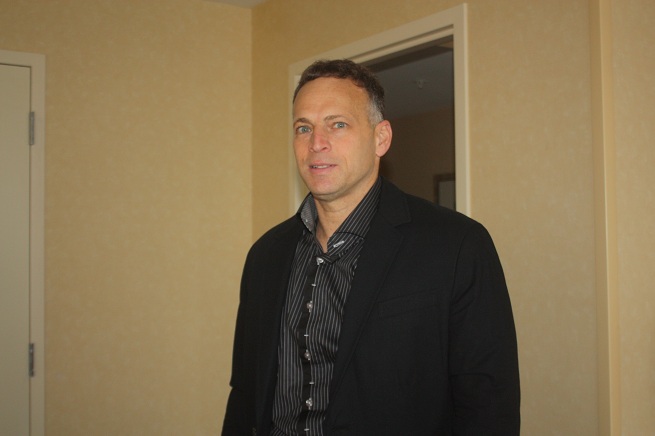Jeff Herbst and his employer Nvidia “get it” when it comes to emerging technologies. For a long time, he has been finding startups for Nvidia, the world’s largest maker of standalone graphics chips, to invest in. Back then, his team found Keyhole, a mapping startup that later became Google Earth and which spurred demand for non-gaming 3D graphics on PCs.
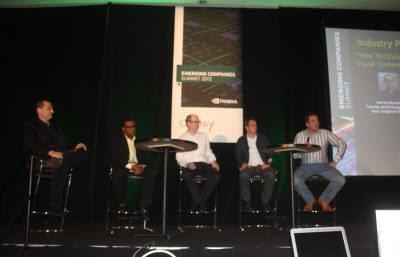
The goal isn’t just to make money but to lift the whole ecosystem for visual computing so everyone can prosper. Such investments are aimed at spurring activity in Nvidia’s business, which includes Tegra mobile processors and CUDA non-graphics computing functions performed by its graphics chips. This week, Nvidia expanded that further with the launch of its Grid Visual Computing Appliance server and its future graphics chip roadmap.
Herbst, the vice president of business development at Nvidia, has been staging tech contests at company events for the past five years. At this year’s GPU Technology conference in San Jose, Calif., Herbst hosted the fifth annual Emerging Companies Summit, where 21 companies made appearances to pitch investors. All of the companies were riffing on the theme of visual computing, which Nvidia espouses as a way to broaden the reach of its graphics processors.
Here’s an edited transcript of our interview with Herbst.
GamesBeat: So this is your latest Emerging Companies Summit. What’s new?
Jeff Herbst: Yeah, we’ve come back. Our fifth event in San Jose and our eighth event worldwide. My two themes for this year were to explain to people who Nvidia gets it and that we’re here to help.
When I say we “get it,” I mean that when people are doing things with graphics processors and visual computing, high-performance computing, cloud computing, mobile computing, and they want to explain it to someone who is going to understand what they’re doing and why, we’re here. We get it.
There’s a story that Keyhole Corporation, now known as Google Earth, came to us back in 2001. Nobody got it. Keyhole itself thought that the application was going to be used for real estate developers and real estate professionals to be able to view property before they bought it. I immediately realized that that’s a decent market. It’s probably in the millions. But there are billions of people that use Google and Yahoo and all the other search engines and portals. They were having trouble getting people to give them money based on that original business model.
We got it, and we helped. Now they’re Google Earth. We’re trying to do the same thing over and over. The ECS is a big part of how we do that. People know that we’re going to understand what they’re doing. The other companies who are here understand what they’re doing. The VCs and investors in our network understand what we’re doing.
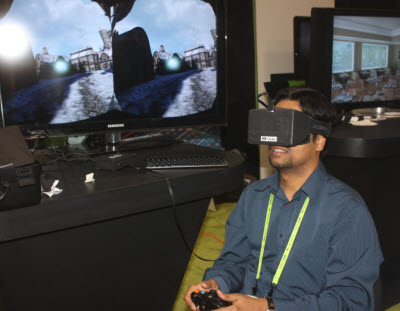 GamesBeat: How have the amounts available to you changed over the years? How much can you invest in a year?
GamesBeat: How have the amounts available to you changed over the years? How much can you invest in a year?
Herbst: We have no limits, up or down, on what we can do. It’s all based on the amount of strategic synergy that we find with the companies. We’re not financial investors in that we typically don’t invest without some kind of strategic partnership associated with the investment. If the companies don’t really need our money or there are Sand Hill Road VCs that want to give them money, we’re more than happy to facilitate that and watch those companies prosper and those investors prosper. Our ecosystem benefits from that.
To us, it’s all about building the ecosystem. It’s not about financial returns. However, to the extent that we do invest, we would like to achieve both. We won’t invest in things that don’t have a promise of financial return. It’s a delicate balance.
GamesBeat: Historically, have you been going up or down with the investment amounts over the years?
Herbst: Our investments have ranged from $500,000 to $10 million. We just made another investment in the $2-million range. We haven’t announced it. Our sweet spot is probably about $2-3 million. It depends on the situation. There’s no reason we couldn’t invest a lot more than that if the situation dictated it.
GamesBeat: Have you had a cycle of sorts as well? Was there a peak here for you and a fall-off from that?
Herbst: We were very active about two or three years ago. Then we became a little bit less active for a variety of reasons, one of which was — I think when you invest in companies, you want to have great partners, and you want to have financial investors backing you. The venture cycle tailed down over the last couple of years. I feel it’s coming back, though.
We’re also seeing a lot more opportunities for us to synergize companies with more than just giving them money. I expect the cycle to keep moving up. Right now our active portfolio is about 10 companies. We’ve had some exits in the past. I would give you all the names, but we don’t publicize all the things we do. It’s not about us. We don’t feel like we have to put out a press release every time we invest money in some startup to boost our own ego or pump our own company.
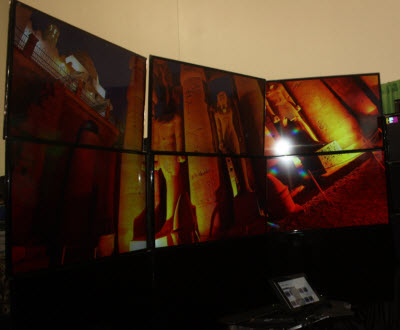
GamesBeat: Is this year’s financial environment a good one for investment?
Herbst: It feels like things are picking up to me. It feels like the financial investors are more willing to invest in earlier-stage companies. The biggest risk I see with early stage companies and ideas is not that the ideas are not good, but that they run out of money before they can fulfill that potential. You always want to be investing in a situation where there’s enough people around the table to keep that thing funded, so it can get to an inflection point of sorts where they become profitable or reach a milestone where they can easily raise the next round of money.
That’s where a lot of companies are having trouble. A lot of companies are getting seed money right now, but it’s that Series A, Series B void that people are experiencing. A lot of people with late-stage money want to come in after the business model is proven and the company is successful. It’s getting the money before the point where you can get profitable that’s hard.
GamesBeat: I was looking at the numbers for last year in investments for games. The amount per deal went way down, but then the most common kind of company that got funded was a mobile game company. They just don’t need as much money. They’re getting to 10 people and then becoming profitable.
Herbst: Yeah. We’ve invested in gaming companies before. We invested in NaturalMotion. We’re looking for applications other than games as well, though. I’d say most of our investments are in software or middleware companies that are not gaming.
GamesBeat: With CUDA (Nvidia’s use of non-graphics computing functions on graphics chips), was there a kind of bulge of CUDA investments?
Herbst: No, I think those have been steady. The last one of those we publicly announced was a company called Rocketick, which is building an EDA software tool for verifying semiconductor chips. They’re able to accelerate the process by over 50 times, using CUDA and GPUs. They’re allowing people, including Nvidia, to build chips faster and get to market faster. We make more money. There’s a real ROI to something like that.
GamesBeat: What about allies like Ouya, a startup that is using your Tegra chips?
Herbst: They’re using Tegra 3. Let me just say, though, that we’re very strategically aligned with Ouya. But I can neither confirm nor deny that we’ve invested in them. Certain things we don’t talk about publicly. I think they will need money — they’re going to build a gaming console that requires a lot of money. There’s a lot of inventory.
GamesBeat: Does it still require hundreds of millions of dollars, though?
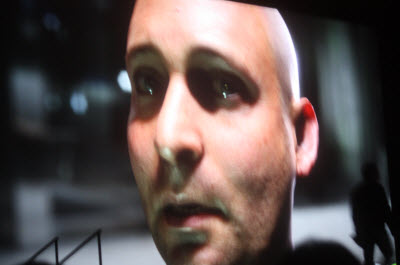
Herbst: Not hundreds of millions. They need to do marketing, though, and they need to build some inventory ahead of launch. Even if it’s $100, $200 dollars, if they’re trying to sell 10 million of them, do the math. Ten million at $200 dollars is a lot of inventory. They have to have some capital. But you should talk to them about that.
GamesBeat: What is the outlook for this year? Are you finding lots of new companies?
Herbst: Tons. The pipeline is bigger than it’s ever been. There’s a lot of action in mobile. There’s a lot of activity in cloud. There’s a lot of activity in gesture recognition and vision. Those are three of the biggest categories I’m seeing. Big data and finance, too.
This morning, one of the things we did for ECS is we stacked the deck with companies doing financial modeling and big data applications. We brought in a guy from this company called Ovum, a financial services company. We purposely stacked the deck this morning to talk with those companies, because we’re seeing a lot of activity around using GPUs to crunch massive amounts of data for financial and other applications.
GamesBeat: As far as locations, where you do your investing? Is Silicon Valley still the top spot for you?
Herbst: I’d say it’s spread throughout the world. This is one of the challenges for me: being global. It’s not easy to invest in companies around the world. Sometimes you’re on the board. Sometimes you’re on the observer board. It’s challenging. But I would not say that, for the stuff we’re doing, there’s any dominance in the U.S. We see a ton of great stuff in Israel, a ton of great stuff in Europe, and some in the U.S.
GamesBeat: Are there any chip companies there?
Herbst: We typically don’t invest in chip companies. [Laughs] No surprise there.
GamesBeat: Cisco invested in a router company.
Herbst: Well, I’m not saying we’ve never done it, and we wouldn’t do it, but here’s the thing. The graphics processor is becoming so powerful that if anything, we see companies that used to be chip companies turning themselves into software companies. A great example is Elemental Technologies, which we did invest in. They’re doing amazingly well. They started life thinking they were going to build a transcoding chip, but they realized the GPU had more than enough power to go do that. They built the software and an appliance. Elemental now does work for major networks. They were transcoding stuff for the Olympics.
What we want people to do is go figure out how to build on top of our platform and on top of our ecosystem. Don’t reinvent what we’ve already invested billions of dollars of R&D to build. That’s a foolish endeavor. If you leverage all that investment we’ve made, you’ll build a business. Elemental is a great example.
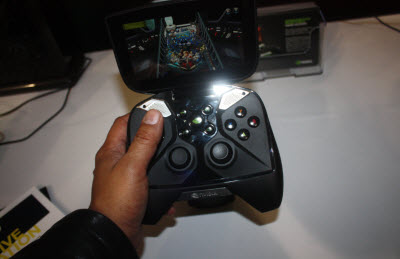
GamesBeat: How about for these different projects? Now you’ve got systems going out, like Project Shield (pictured right) and the VCA thing, the servers. Do you need to seed those areas?
Herbst: We’re looking at that. We are very open to that. I think you’ll see us make some investments in that area over the next year or two. It’s definitely a big area. I call that “cloud” in general when I say that’s an area that we’re very interested in.
GamesBeat: With Shield, would that mean more game developers?
Herbst: I’d say it’s more VCA than Shield right now. Shield really is newer than VCA. In reality, Shield is not yet into the marketplace. Once Shield is out and people are using it, I see that as a very big beachhead for all kinds of partnerships, relationships, and investments that Nvidia could make over the next few years. That’s just getting started. Cloud we’ve been working on for a longer period of time. If you recall even a year ago at GTC, Jen-Hsun [Huang, CEO of Nvidia] was talking about the GRID.
GamesBeat: Shield already has all those Tegra Zone games anyway.
Herbst: Yeah. Once Shield is out, you’ll see a lot of content migrate to the platform because they’re basically Android and PC games.
If you’re around at three o’clock, we have Oculus coming to present. We have a couple of companies at three. Cortexica, they’re doing computer vision. At two we’ve got a panel discussion about how technology will shape the future monetization of visual content, so they’re going to talk about new ways people will do advertising — all the business models and how they could change visual search. Then we have companies coming up to do standard 15-minute presentations. We also have a guy from Cortexica on the panel. I’m giving them a lot of airplay, which tells you how I feel about them. [Chuckles] We really like them.
GamesBeat: Any final words?
Herbst: The themes remain the same. We get it. We understand what these companies are doing and we want to help. That’s why we do this. We want to support the ecosystem.
VentureBeat's mission is to be a digital town square for technical decision-makers to gain knowledge about transformative enterprise technology and transact. Learn More
